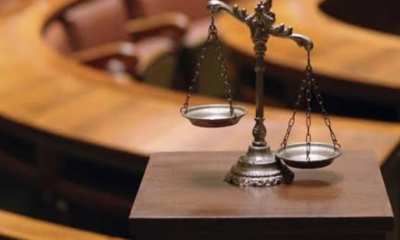Sports
What Do UK Government Sanctions Mean For Chelsea FC?
What Do UK Government Sanctions Mean For Chelsea FC?
The future of European champions Chelsea is uncertain after sanctions were placed on Russian owner Roman Abramovich on Thursday.
The billionaire has been in charge since 2003 but had his attempts to sell the club halted by the UK government, which has frozen his assets.
What does it mean for Chelsea’s fans, players and staff? BBC Sport explains how the situation will affect those associated with the club.
What exactly happened on Thursday?
Abramovich was sanctioned by the UK government as part of its response to Russia’s invasion of Ukraine.
The government believes the billionaire has had a “close relationship for decades” with Russia’s president Vladimir Putin, links Abramovich has always denied.
Like the rest of his assets, Chelsea would have been frozen but a special licence granted by the government allows the Stamford Bridge club to keep operating.
Can Chelsea continue to play games?
Yes.
The special licence issued by the government allows the men’s and women’s teams to fulfil their fixtures for the rest of this season as normal.
Chelsea’s men won away at Norwich in the Premier League on Thursday while Chelsea’s women were victorious at West Ham in the Women’s Super League at the same time.
What does it mean for match-going fans?
Season-ticket holders will still be able to attend games at Stamford Bridge as normal, while match tickets sold before 10 March will be honoured.
But beyond that, supporters cannot buy any new tickets to watch Chelsea.
Tickets were due to go on sale for the FA Cup quarter-final tie at Middlesbrough on 19 March but a post on the club’s official website on Thursday confirmed that would no longer happen as planned.
The club is also unable to sell any merchandise, with the club shop at Stamford Bridge closing on Thursday morning.
Can Chelsea sell season tickets for next year?
All the licence says is that anyone who purchased season tickets before 10 March, and makes payments in regular instalments, can “continue to make those payments”.
No mention has been made about future seasons.
Can Chelsea keep paying staff wages in the short and mid-terms?
The government’s special licence allows Chelsea to pay the wages of all employees, including players and coaching staff.
The licence is in place until 31 May, so covers the Blues for the rest of the season and the Treasury has the right to vary, revoke or suspend it at any time.
Do these sanctions mean they cannot transfer players in or out?
While the sanctions are in place, Chelsea are effectively under a transfer ban and are unable to buy or sell players.
They are also unable to negotiate new contracts for the players they currently own, so leaves an uncertain future for those whose current deals expire in the summer.
That applies to Antonio Rudiger, Cesar Azpilicueta, and Andreas Christensen, although the latter two have been linked with a move to Barcelona.
Rudiger was believed to be close to a new deal but current developments leave the defender in a limbo situation.
What about the future of Chelsea men and women head coaches?
It’s the same situation for both Thomas Tuchel and Emma Hayes – nobody has any idea how this will affect them yet.
They have got contracts, no-one is saying they won’t get paid. However, this is a time of great change. Does it make the club more vulnerable to an approach for either manager from a rival team? Things are likely to change significantly at the club.
Tuchel said the future was uncertain, though he was happy to remain as manager when giving his reaction to Thursday’s developments after Chelsea’s game at Norwich later on the same day.
Hayes, who has been at the club for a decade, signed a long-term contract in July and had her eye on chasing a first Champions League title with Chelsea.
She is extremely well supported within the club and has earned the respect from those high up, having won 10 major trophies during her time in charge.
Hayes was also among the exclusive list of trustees to whom Abramovich attempted to give ‘stewardship’ of Chelsea at the end of last month. Her commitment to the club has never been questioned so fans will no doubt be monitoring the situation cautiously.
Chelsea were put up for sale on 2 March and there are understood to be plenty of interested parties, despite Abramovich being sanctioned.
The UK government is open to considering a further addition to the special licence to allow a sale to proceed.
Those working on the deal on behalf of Abramovich were always told that proceeds from the sale would go to a fund for victims of the war in Ukraine.
This was made clear when Abramovich put the club up for sale last week. It is understood that the £1.5bn loan from Abramovich will not be deducted from the price.
Abramovich had instructed American investment firm Raine Group to seek £3bn for the club, but finance experts believe that an already inflated price could drop further given the current uncertainty around Chelsea.
Raine Group has temporarily halted the sale process while it seeks answers from the government.
How quickly the club can be sold once a buyer has been found depends on the government receiving assurances that the proceeds would not go to Abramovich, but securing those assurances could take time.
What about Chelsea’s participation in European competition?
All we’ve had from Uefa at this stage is that it is “seeking further clarification on the matter” before it comments further.
What Uefa is presumably trying to establish is what happens if Chelsea make it through to the quarter-finals of the Champions League, and can’t sell any tickets.
If Chelsea get to the FA Cup semi-finals, will their section of the ground be empty?
Chelsea’s men’s side are away to Championship side Middlesbrough in the quarter-finals on 19 March (17:15 GMT).
If they win that then they will play at Wembley in the semi-finals on the weekend 16-17 April.
It is unclear at this stage how the the restrictions would impact FA Cup ticket sales if they progressed to Wembley.
Can Chelsea afford away travel, given the government budget?
The government has set a limit of £20,000 per team per match for travel to and from matches.
BBC Sport understands the club considers the £20,000 cap to be too low to allow it to operate normally, and this is a pressing matter given next week the men’s team travel to Lille in the Champions League.
How much are Chelsea’s sponsors worth and how have they reacted?
Within hours of the announcement that Abramovich had been sanctioned by the UK government, Chelsea’ main shirt sponsors suspended their £40m-a-year deal with the club.
Mobile network provider Three had been Chelsea’s official partner since 2020.
It is unclear whether any of Chelsea’s other sponsorship deals are at risk at this stage.
In 2016, the London club signed a new kit deal with US sportswear giants Nike. At the time it was reported to be worth £60m a season for the next 15 years, but the club did not confirm any cash figures.
In May 2021, Chelsea named global hotel search platform Trivago as the club’s official training wear partner in a multi-year partnership.
Chelsea also have a number of other official partners.
Could Chelsea go into administration?
If Chelsea are unable to pay their bills they could go into administration and face a nine-point deduction.
In the short term, it’s to a large extent business as usual. Chelsea will be able to pay wages due at the end of March and will have other overheads.
Chelsea’s wage bill is round about £28m a month. We don’t know how much cash they have in the bank. The most recent accounts we have are from June 2021 when there was £16m in the bank. Abramovich has been injecting money into Chelsea on a regular basis over recent years and presumably that won’t be able to continue.
The concern might be what happens if Chelsea’s cash reserves are insufficient to pay their wage bill – but presumably the government and Premier League, who have been working on this, will have been looking at it to try to minimise disruption on a club level.


 Top Stories23 hours ago
Top Stories23 hours agoDele Farotimi Speaks on Lying Against Afe Babalola After Gaining Freedom

 Politics23 hours ago
Politics23 hours agoPDP Picks Holes In President Tinubu’s Media Chat

 Top Stories23 hours ago
Top Stories23 hours agoCourt Orders DSS To Release Miyetti Allah President Pending Trial

 News23 hours ago
News23 hours ago100+ Merry Christmas Wishes and Prayers to Send to Family & Friends on Xmas 2024

 Top Stories16 hours ago
Top Stories16 hours agoBREAKING: FG ‘Drags Zinox CEO Leo Stan Ekeh, Wife, Others Over Alleged N162M Contract Fraud Case Against FIRS’

 Entertainment21 hours ago
Entertainment21 hours agoSeyi Edun wins hearts as she makes peace with Toyin Abraham, shows support for her new movie; Toyin reacts (Video)

 Entertainment22 hours ago
Entertainment22 hours agoProphet Odumeje issues warning to those discrediting his miracles

 Sports16 hours ago
Sports16 hours agoEngland-Born Ademola Lookman Credits Nigeria Switch For Success







